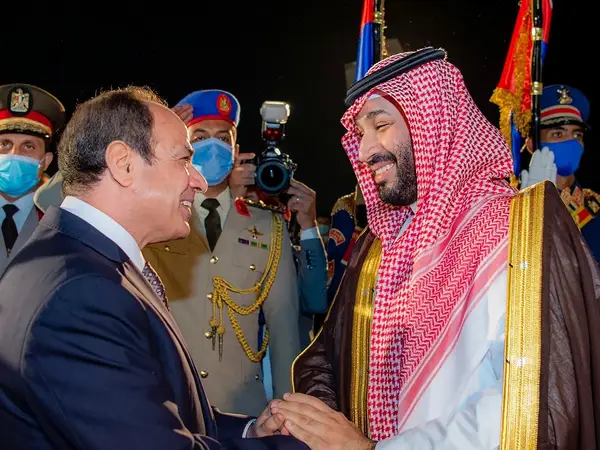Leaders of Israel and Saudi Arabia see July’s regional trip by United States President Joe Biden as an important part of building a coalition against Tehran.
Yair Lapid, Israeli foreign minister and due to be prime minister when Biden arrives July 13, told US Secretary of State Antony Blinken by phone Tuesday that the president’s trip to Saudi Arabia and Israel “would have significant implications for the region and the fight against Iran, as well as immense potential to significantly improve regional stability and security," an Israeli foreign ministry statement said. Israeli Défense Minister Benny Gantz said Monday that Israel was building a US-sponsored air-defense system aimed at curbing drone or missile strikes by Iran and its allies.
Saudi Crown Prince Mohammad bin Salman was Tuesday in Egypt and Jordan, and is due to visit Turkey, repairing his image after the 2018 killing in Istanbul of Washington Post columnist Jamal Khashoggithat US intelligence concluded was done on the prince’s orders. In a move condemned by human rights groups, Turkey in April transferred the Khashoggi murder case to Saudi Arabia.
The Saudi crown prince, whose government has given significant financial support to the Egypt’s President Abdel Fattah al-Sisi who seized power in 2014 from the elected Muslim Brotherhood government, reportedly agreed $7.7 billion in agreements over food, transport, energy and pharmaceuticals. Egypt, the world’s largest importer of wheat, faces food shortages due to the Ukraine crisis.
While Saudi Arabia quietly favored Israel’s 2020 ‘normalization’ agreements with the United Arab Emirates and Bahrain, brokered by US President Donald Trump and advisor Jared Kushner, it has refrained from establishing diplomatic and formal ties with Israel.
Prince Mohammad’s first visit to Jordan came as Jordan's economy, like Egypt’s, struggles with the knock-on effects of the Ukraine war. Business leaders and officials expressed hope the Saudis will now deliver on past promises of $3 billion investment.
Summit Next Month
The Saudi crown prince and Jordan’s King Abdullah also discussed a summit next month where Biden will meet leaders of the six Sunni-led states of the Gulf Corporation Council, as well as Iraq, Jordan, and Egypt. King Abdullah is credited with the phrase ‘Shia crescent,’ which he used in 2004 to describe Iran’s growing regional influence.
Israel and the UAE inked May 31 a free-trade agreementfollowing up their 2020 ‘normalization’ agreement, and March’s meeting in Negev, Israel, of the foreign ministers of Israel, Bahrain, Egypt, Morocco, the UAE and the US, is planned as an annual event.
Israel and Saudi Arabia share concerns over Iran’s foreign policy os supporting militant proxies in the region, including Hezbollah and Ansar Allah in Yemen and have supported those who were willing to oppose Iranian influence. The Israeli and Saudi leadership have also opposed the 2015 Iran nuclear deal, from which Trump withdrew the US in 2018 and which the Biden administration says it wants to restore.
But while Biden came to office committed to recalibrating Washington’s links with Saudi Arabia, especially in asserting human rights, and initially dealt with Riyadh frostily, relations have thawed, partly as the US feels the need for increased Saudi oil exports to bear down on the rising cost of gasoline.
Domestic politics are also at work in Israel. The government Monday called a national election – the fifth in three years. Prime Minister Naftali Bennett has trumpeted a more assertive approach to Iran than opposition leader and former premier Benjamin Netanyahu, who hopes to return to power.
While there are Israeli security experts who see Bennett’s approach as counter-productive and who disregard talk of an Israeli-Sunni alliance, Bennett has used the phrase ‘Octopus Doctrine’ to describe drone or sabotage attacks on Iran’s nuclear and military sites, a campaign widely believed to also include killing scientists, engineers, and military officers.
With reporting by Reuters
